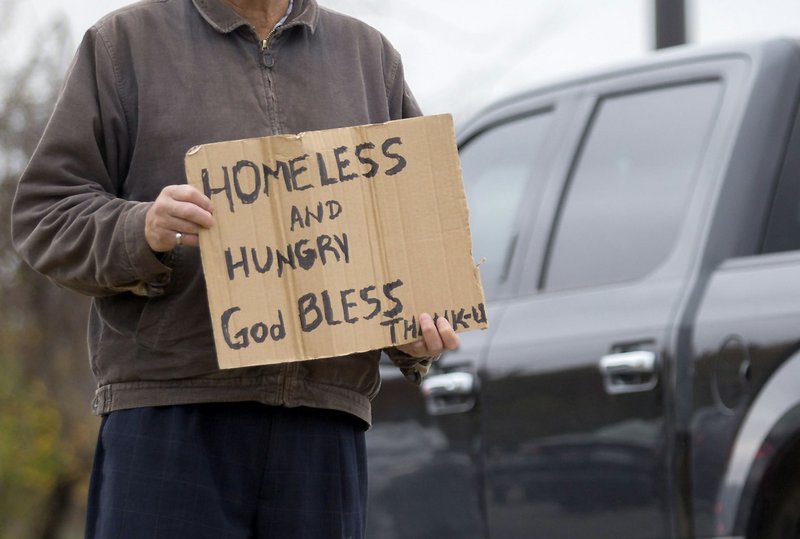Just more than a decade after Little Rock installed containers downtown for visitors to deposit money that they might otherwise have given to panhandlers, the orange boxes have been taken down without much in them.
The Downtown Little Rock Partnership kicked off "Change for the Better" in 2008, installing 28 boxes and signs that encouraged people not to "give in" to panhandlers and instead put money in the orange boxes. The boxes would be emptied by the city, and any money in them would be distributed to organizations serving the city's homeless.
City spokesman Lamor Williams said last week that the program hadn't been very successful and was being discontinued. Crews were seen removing the boxes Tuesday.
That resulted in a quart-size Ziploc bag of coins, plus some dollar bills covered in black mold, said Gabe Holmstrom, who has headed the Downtown Little Rock Partnership since 2015. It totaled $65.85, which will be turned into a check to Jericho Way Day Resource Center.
Holmstrom said the only other time that he was aware of that the boxes were emptied was in 2018. They'd collected $327, which was also given to Jericho Way, he said.
Holmstrom said the boxes were taken down in part because some were attached to old parking meters that were being removed.
"Sometimes things work well, and sometimes they work for a little bit and then we discontinue them and try something else," he said. "We've got to keep trying."
Sharon Priest, executive director of the Downtown Little Rock Partnership until 2015, said she remembers that some money was collected from the boxes every month.
"Did it ever break the bank? No. We never collected a ton of money," Priest said. "Mostly it was loose change ... would we get bills? Yes, occasionally. Would we get a $100 bill? Not that I can ever recall. I would remember that."
The Arkansas Democrat-Gazette reported in 2012 that donations had fallen short of expectations, with the boxes in total getting an average of $44 a month. Priest told the newspaper at the time that $2,093.34 had been collected between October 2008 and Nov. 2, 2012.
Jericho Way opened in 2013. When the city kicked off the program, the money was said to be split among homeless organizations in Little Rock and North Little Rock: Friendly Chapel Church of the Nazarene, Our House, River City Ministry, Salvation Army and the Union Rescue Mission/Dorcas House.
The program was inspired by similar efforts in other U.S. cities, including one in Denver that collected $2,000 in its first month, according to a 2008 Democrat-Gazette article.
Little Rock repurposed and painted some old parking-fine payment boxes and purchased others at $80 apiece. Some downtown businesses and other agencies sponsored the boxes, paying $14,700 in $300 to $1,000 donations for one to three years of sponsorship, which went toward buying the boxes and promotional materials, according to previous Democrat-Gazette coverage.
Priest recalled that the city also produced cards that people could give to homeless individuals that listed organizations offering social services.
"We did some publicity on it so people would know what it was," she said of the program. "My guess is now, nobody knows what they're there for."
Aaron Reddin, founder of The Van, said he saw the program as callous and is glad to see the boxes being taken down. The Van delivers food, clothing and other supplies to people living on the streets or camping.
"You're discouraging people directly assisting people in the community," he said. "If everyone looked out for everyone around them, The Van wouldn't have to exist. I just think it's far more effective for people to look out for people that are right in front of their faces."
Reddin said the boxes were part of a broader attitude of hostility toward homeless people that included measures such as a panhandling ban, which was overturned by a court. Attitudes have improved in recent years.
"In the last two to three years, it has felt like it's gotten a little bit better," he said. "I think people have started to realize that this isn't an issue that's going to get flipped in one night."
But anti-panhandling efforts persist.
Cabot recently installed signs encouraging people to give to local charities rather than panhandlers. Mayor Ken Kincade defended the signs in a Facebook post in September, saying people panhandling in Cabot were not homeless and were deceiving the public.
Reflecting on the Little Rock program, Priest said it didn't make sense to continue a program that wasn't effective. She added that it's difficult to help people who want to remain on the streets, or those with mental health problems.
"It's a problem that nobody's come up with a really good solution for," she said.
Metro on 12/15/2019

